九年级英语Unit1
九年级英语上学期Unit1重难点分析

九年级英语上学期Unit1重难点分析引言九年级英语上学期的Unit1是学生们的新起点,它是整个学期的开篇单元。
这个单元主要涉及一些基础的语法知识和词汇,以及阅读和写作技巧的提升。
本文将对此单元的重难点进行分析,并给出相应的学习建议,希望能为学生们的学习提供一些帮助。
重点一:一般过去时在Unit1中,学生将学习一般过去时的用法。
一般过去时表示过去发生的动作或存在的状态,它的构成是动词的过去式。
例如:“I played basketball yesterday.”(我昨天打篮球。
)这一部分的重点在于学生们掌握一般过去时的构成形式以及正确使用时态符号。
学生们可以通过大量的阅读和写作练习来巩固这个知识点。
重点二:词汇积累Unit1中涉及的词汇相对较多,包括名词、动词、形容词等。
学生们需要掌握这些词汇的读音、词义以及用法。
他们可以通过默写、记忆卡片和词汇游戏等方式来巩固词汇。
另外,建议学生们使用这些词汇进行句子的构造和写作练习,以便更好地理解和运用这些词汇。
重点三:阅读理解与写作在Unit1中,学生们将进行一些阅读理解和写作练习。
阅读理解部分要求学生们从文章中获取关键信息,并回答问题。
写作部分要求学生们根据提示写出一段短文。
这一部分的重点在于学生们理解文章的主题和细节,并能够用正确的语言表达出来。
建议学生们多做阅读理解和写作练习,培养自己的阅读和写作能力。
难点一:一般过去时和现在完成时的区别在Unit1中,学生们将学习一般过去时和现在完成时的区别。
一般过去时表示过去发生的动作或存在的状态,而现在完成时表示过去发生的动作对现在产生的影响或结果。
例如:“I went to Paris last year.”(我去年去了巴黎。
)和“I have been to Paris.”(我去过巴黎。
)这一部分的难点在于学生们准确理解和使用这两个时态。
建议学生们通过对比这两个时态的句子进行练习,以加深对它们的理解。
难点二:定语从句Unit1中的写作部分要求学生们使用定语从句来扩展句子。
Unit1(单元知识清单)九年级英语全一册系列(人教版)

Unit 1 How can we become good learners?重要知识点清单【精讲01 词汇】►►►1.aloud adv.大声地;出声地►►►2. sound作连系动词,“听起来”,其后常跟形容词。
—Listen! What a beautiful sound! ——听!多么美妙的声音!—Yes. It sounds like a bird. ——是的。
它听起来像一只鸟。
【知识拓展】英语中常用的连系动词:一是(be),一感(feel),三保持(keep\remain\stay),二:……起来:(sound, look, smell, taste),三:好像(seem),变了:(get, turn, become)。
四:prove come true go hungry►►►常用结构:be afraid to do sth. 意为“害怕做某事”I am afraid to travel by plane. 我怕乘飞机旅行。
【知识拓展】—Excuse me, may I take the dogs with me, sir? —不好意思,先生,我可以携带狗吗?—It’s afraid not. Pets are not allowed in here. You can keep it in the Animal Center next door.—恐怕不行。
宠物不得进入这里。
你可以把它放在隔壁的动物中心。
►►►4. discoverdiscover是指“发现”原来就有而一直没被发现的东西(如电、煤、石油等矿藏及新星、星系或科学真理等)Scientists have discovered different kinds of ways to treat the illness since 50 years ago.自50年前以来,科学家们已经发现了不同的治疗方法。
Edison invented the light bulb. 爱迪生发明了电灯泡。
Unit1单词及词性转换知识点汇总人教版英语九年级全册
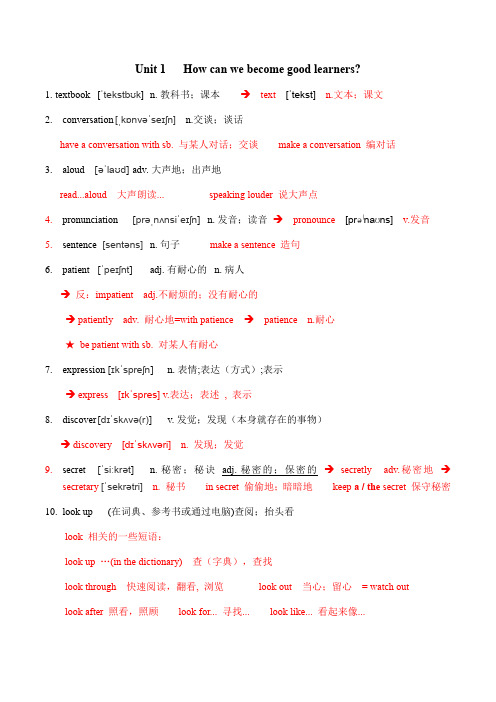
Unit 1 How can we become good learners?1.textbook [ˈtekstbʊk]n.教科书;课本→text [ˈtekst]n.文本;课文2.conversation[ˌkɒnvəˈseɪʃn] n.交谈;谈话have a conversation with sb. 与某人对话;交谈make a conversation 编对话3.aloud [əˈlaʊd]adv.大声地;出声地read...aloud 大声朗读...speaking louder 说大声点4.pronunciation [prəˌnʌnsiˈeɪʃn]n.发音;读音→pronounce [prəˈnaʊns]v.发音5.sentence[sentəns]n.句子make a sentence 造句6.patient[ˈpeɪʃnt]adj.有耐心的n.病人→反:impatient adj.不耐烦的;没有耐心的→ patiently adv. 耐心地=with patience →patience n.耐心★be patient with sb. 对某人有耐心7.expression [ɪkˈspreʃn]n.表情;表达(方式);表示→ express [ɪkˈspres] v.表达;表述, 表示8.discover[dɪˈskʌvə(r)]v.发觉;发现(本身就存在的事物)→discovery [dɪˈskʌvəri] n. 发现;发觉9.secret[ˈsiːkrət]n.秘密;秘诀adj.秘密的;保密的→secretly adv.秘密地→secretary [ˈsekrətri] n. 秘书in secret 偷偷地;暗暗地keep a / the secret 保守秘密10.look up (在词典、参考书或通过电脑)查阅;抬头看look 相关的一些短语:look up …(in the dictionary) 查(字典),查找look through 快速阅读,翻看, 浏览look out 当心;留心= watch outlook after 照看,照顾look for... 寻找... look like... 看起来像...look at... 看... take / have a look (at…) 看一看...look forward to (doing) sth. 期待(做)某事look back on/at 回顾,回忆,回首(往事)11.grammar[ˈɡræmə(r)]n.语法12.repeat[rɪˈpiːt]v.重复;重做13.note [nəʊt]n.笔记;记录v.注意;指出→ notebook n. 笔记本make notes = take notes 记笔记14.pal[pæl]n.朋友;伙伴 a pen pal 笔友15.physics[ˈfɪzɪks]n.物理;物理学→ physical [ˈfɪzɪkl]adj. 身体的;物理学的16.chemistry [ˈkemɪstri] n.化学→chemical [ˈkemɪkl]adj.化学的→ chemist [ˈkemɪst]n. 化学家,药剂师17. memorize ['meməraiz] v. 记忆;记住→memory [ˈmeməri]n.记忆复数: memories18.pattern[ˈpætn]n.模式;方式19.pronounce[prəˈnaʊns] v.发音→ pronunciation[prəˌnʌnsiˈeɪʃn]n.发音;读音20.increase[ɪnˈkriːs]v.增加;增长→反: decrease v. 减少;降低/ reduce v. 减少;缩小★increase by…增加了…increase to….增加到….21.speed[spi:d]n.速度v.加速(speed-sped-sped)speed up 加速at speed 高速,快地at a speed of ... 以....速度22.partner[pa:(r)tnə(r)]n.搭档;同伴→ part n.部分;角色;地区v.分开23.born [ bɔ:n] v.出生adj. 天生的→ birth n.出生give birth to...生育...at birth 在出生时= when sb./sth. was born → birthday n.生日be born in + 年/月be born on + 日期be born with…天生具有…be born + adj. He was born blind.24.be born with 天生具有25.ability[ə’biləti]n.能力;才能★have the ability to do sth. 有做某事的能力→ able adj. 有能力的,能够的→反:unable → disabled adj. 肢体残疾的be able to do sth. 有能力做某事→反:be unable(=not able)to do sth.26.create [kriˈeɪt] v.创造;创建→creation [kriˈeɪʃn]n..创造→ creator n.创造者→ creative [kriˈeɪtɪv] adj.有创造力的→ creativity [ˌkri: eɪˈtɪvəti] n.创造力,创造性27.brain[breɪn]n.大脑brain storm 头脑风暴28.active[ˈæktɪv]adj.活跃的;积极的→ act n. & v. 行为;举动→ actor/actress n.男演员/女演员→ action n. 行动;行为→ activity n. 活动(复数): activities29.attention [əˈtenʃn]n.注意;关注30.pay attention to(to是介词)注意;关注31.connect [kəˈnekt]v.(使)连接;与⋯⋯有联系→ connection n.连接;联系32.connect … with... 把...和...连接或联系起来33.overnight[ˌəʊvəˈnaɪt]adv.一夜之间;在夜间→ night n. 夜;黑夜at night/ in the night在夜里→ tonight adv.在今夜;在今晚→ midnight n. 半夜at midnight 在半夜until midnight 直到半夜34.review[rɪˈvjuː] v. & n.回顾;复习= go over →反:preview v.&n. 预习;预览→view n.看法,意见;视野v. 看待;查看→ interview n.&v. 面试;采访35.knowledge[ˈnɒlɪdʒ][U.]知识;学问→ knowledgeable [ˈnɒlɪdʒəbl] adj. 有知识的;知识渊博的36.lifelong adj.终身的;毕生的37.wisely adv. 明智地;聪明地→ wise adj.明智的→ wisdom n.智慧。
人教版九年级英语Unit1单词、课文_知识梳理_词汇句式精讲
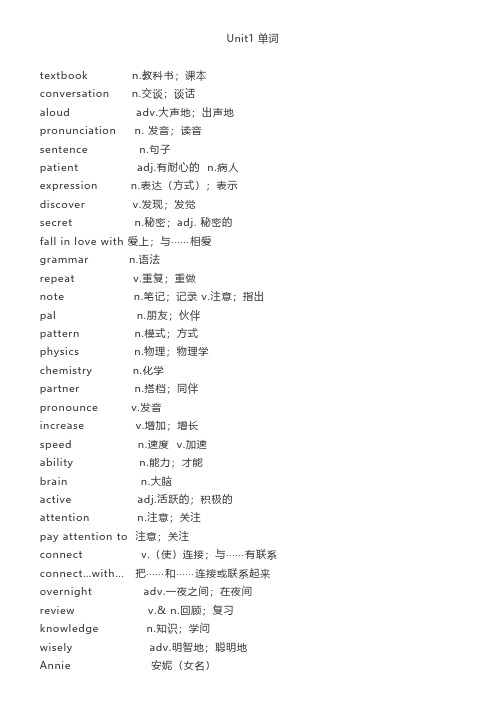
Unit1 单词textbook n.教科书;课本conversation n.交谈;谈话aloud adv.大声地;出声地pronunciation n. 发音;读音sentence n.句子patient adj.有耐心的 n.病人expression n.表达(方式);表示discover v.发现;发觉secret n.秘密;adj. 秘密的fall in love with 爱上;与⋯⋯相爱grammar n.语法repeat v.重复;重做note n.笔记;记录 v.注意;指出pal n.朋友;伙伴pattern n.模式;方式physics n.物理;物理学chemistry n.化学partner n.搭档;同伴pronounce v.发音increase v.增加;增长speed n.速度 v.加速ability n.能力;才能brain n.大脑active adj.活跃的;积极的attention n.注意;关注pay attention to 注意;关注connect v.(使)连接;与⋯⋯有联系connect…with... 把⋯⋯和⋯⋯连接或联系起来overnight adv.一夜之间;在夜间review v.& n.回顾;复习knowledge n.知识;学问wisely adv.明智地;聪明地Annie 安妮(女名)Alexander Graham Bell 格雷厄姆 • 贝尔Unit1 知识梳理Unit 1 How can we become good learners?【重点短语】1. good learners 优秀的学习者2. work with friends 和朋友一起学习3. study for a test 备考4.have conversations with 与……交谈5.speaking skills 口语技巧6.a little 有点儿7.at first 起初 起先8.the secret to... .......的秘诀9.because of 因为10.as well 也11.look up 查阅;抬头看12.so that 以便,为了13.the meaning of ……的意思14.make mistakes 犯错误15.talk to 交谈16.depend on 依靠 依赖17.in common 共有的18.pay attention to 注意 关注19. connect …with …把……联系20.for example 例如21.think about 考虑22.even if 即使 尽管 纵容23.look for 寻找24.worry about 担心 担忧25.make word cards 制作单词卡片26.ask the teacher for help 向老师求助27.read aloud 大声读28.spoken English 英语口语29.give a report 作报告30.word by word 一字一字地31. so……that 如此……以至于32.fall in love with 爱上33.something interesting 有趣的事情34.take notes 记笔记35.how often 多久一次36.a lot of 许多37.the ability to do sth. 做某事的能力38.learning habits 学习习惯39.be interested in 对……感兴趣40.get bored 感到无聊【重点句型】1.提建议的句子:①What/ how about +doing sth.? 做…怎么样?如:What/ How about going shopping?②Why don't you + do sth.? 你为什么不做…?如:Why don't you go shopping?③Why not + do sth. ? 为什么不做…?如:Why not go shopping?④Let's + do sth. 让我们做…吧。
九年级英语unit1语法知识点
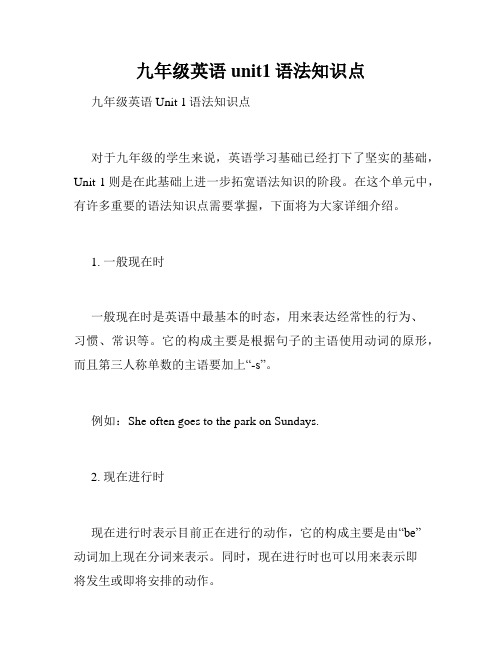
九年级英语unit1语法知识点九年级英语Unit 1语法知识点对于九年级的学生来说,英语学习基础已经打下了坚实的基础,Unit 1则是在此基础上进一步拓宽语法知识的阶段。
在这个单元中,有许多重要的语法知识点需要掌握,下面将为大家详细介绍。
1. 一般现在时一般现在时是英语中最基本的时态,用来表达经常性的行为、习惯、常识等。
它的构成主要是根据句子的主语使用动词的原形,而且第三人称单数的主语要加上“-s”。
例如:She often goes to the park on Sundays.2. 现在进行时现在进行时表示目前正在进行的动作,它的构成主要是由“be”动词加上现在分词来表示。
同时,现在进行时也可以用来表示即将发生或即将安排的动作。
例如:He is studying English in the library.3. 一般过去时一般过去时用来表示过去发生的动作或存在的状态。
它的构成主要是根据句子的主语使用动词的过去式,同时肯定句中要使用助动词“did”。
例如:They visited their grandparents last weekend.4. 过去进行时过去进行时表示在过去某个时间段正在进行的动作。
它的构成主要是由“was/were”动词加上现在分词来表示。
例如:I was watching TV when he called me.5. 一般将来时一般将来时主要用来表达将来的动作或事情。
它的构成主要是由“will/shall”加上动词原形来表示。
例如:We will have a picnic next Sunday.6. 情态动词情态动词可以用来表达能力、可能性、推测以及许可等。
常见的情态动词有can、may、must、shall、will等。
值得注意的是,情态动词后面的动词使用原形。
例如:You must finish your homework.7. 句型及从句九年级的学生还需要学习掌握一些常见的句型和从句的用法。
九年级人教版英语书本笔记unit1
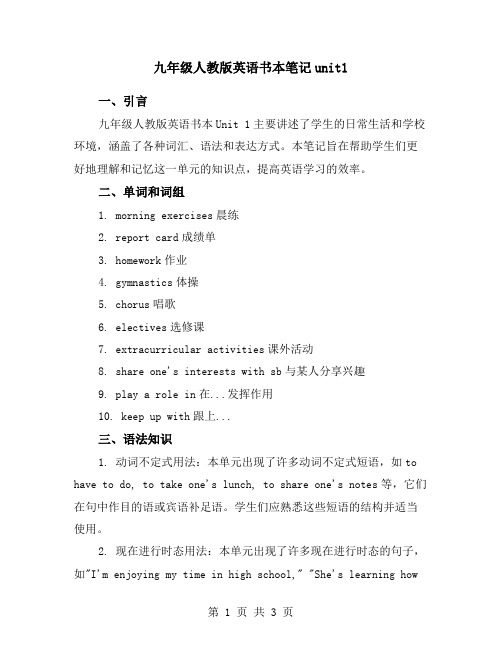
九年级人教版英语书本笔记unit1一、引言九年级人教版英语书本Unit 1主要讲述了学生的日常生活和学校环境,涵盖了各种词汇、语法和表达方式。
本笔记旨在帮助学生们更好地理解和记忆这一单元的知识点,提高英语学习的效率。
二、单词和词组1. morning exercises晨练2. report card成绩单3. homework作业4. gymnastics体操5. chorus唱歌6. electives选修课7. extracurricular activities课外活动8. share one's interests with sb与某人分享兴趣9. play a role in在...发挥作用10. keep up with跟上...三、语法知识1. 动词不定式用法:本单元出现了许多动词不定式短语,如to have to do, to take one's lunch, to share one's notes等,它们在句中作目的语或宾语补足语。
学生们应熟悉这些短语的结构并适当使用。
2. 现在进行时态用法:本单元出现了许多现在进行时态的句子,如"I'm enjoying my time in high school," "She's learning howto play the guitar,"等。
学生们应掌握现在进行时态的结构和用法,了解其在表达情感和计划方面的应用。
3. there be句型用法:本单元出现了许多there be句型,如"There are always lots of students on campus," "There are a lot of interesting activities every week,"等。
学生们应熟悉there be句型的用法,并注意其与have的区别。
人教版九年级全一册英语Unit1单元语法知识点总结
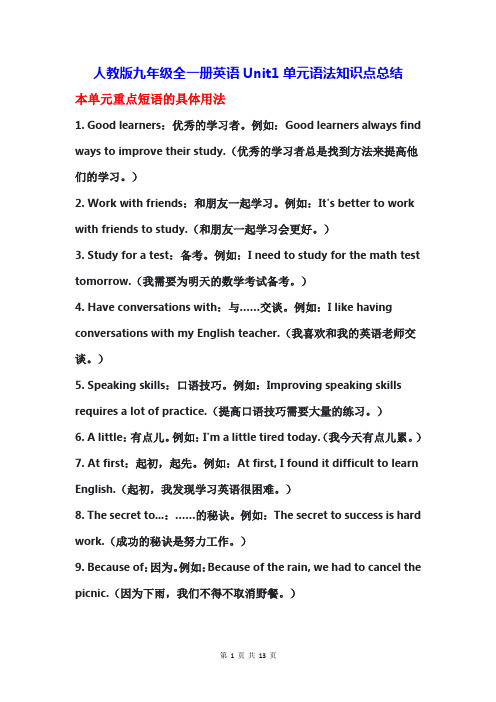
人教版九年级全一册英语Unit1单元语法知识点总结本单元重点短语的具体用法1. Good learners:优秀的学习者。
例如:Good learners always find ways to improve their study.(优秀的学习者总是找到方法来提高他们的学习。
)2. Work with friends:和朋友一起学习。
例如:It's better to work with friends to study.(和朋友一起学习会更好。
)3. Study for a test:备考。
例如:I need to study for the math test tomorrow.(我需要为明天的数学考试备考。
)4. Have conversations with:与……交谈。
例如:I like having conversations with my English teacher.(我喜欢和我的英语老师交谈。
)5. Speaking skills:口语技巧。
例如:Improving speaking skills requires a lot of practice.(提高口语技巧需要大量的练习。
)6. A little:有点儿。
例如:I'm a little tired today.(我今天有点儿累。
)7. At first:起初,起先。
例如:At first, I found it difficult to learn English.(起初,我发现学习英语很困难。
)8. The secret to...:……的秘诀。
例如:The secret to success is hard work.(成功的秘诀是努力工作。
)9. Because of:因为。
例如:Because of the rain, we had to cancel the picnic.(因为下雨,我们不得不取消野餐。
初中英语 Unit1课文及单词表人教版九年级全一册

Unit 1 How can we become good learners? 【Vocabulary】textbook /tekstbuk/ n.教科书;课本p.1conversation /kɔnvəs eɪʃn/, n.交谈;谈话p.2aloud /əlaud/ adv.大声地;出声地p.2pronunciation /prənʌnsieIʃn/ n.发音;读音p.2sentence /sentəns/ n.句子p.2patient /peiʃnt/ adj.有耐心的n.病人p.2expression /ikspreʃn/ n.表达(方式);表示p.3discover /dIskʌvə (r)/ v.发现;发觉p.3secret /si:krət/ n.秘密;adj. 秘密的;p.3look up 查阅;抬头看p.3grammar /græmə (r)/ n.语法p.3repeat /ripi:t/ v.重复;重做p.4note /nəut/ n. 笔记;记录v.注意;指出p.4pal /pæl/ n.朋友;伙伴p.4physics /fiziks/ n.物理;物理学p.4chemistry /kemistri/ n.化学p.4memorize /meməraiz/v.记忆;记住p.4pattern /pætn/, /pætən/ n.模式;方式p.4pronounce /prənauns/ v.发音p.5increase /Inkri:s/ v.增加;增长p.5speed /spi:d/ n.速度v.加速p.5partner /pa:(r)tnə (r)/ n.搭档;同伴p.5born /bɔ:n/ v.出生adj. 天生的p.6be born with 天生具有p.6ability /əbiləti/ n.能力;才能p.6create /krieit/ v.创造;创建p.6brain /brein/ n.大脑p.6active /æktiv/ adj.活跃的;积极的p.6attention /ətenʃn/ n.注意;关注p.6pay attention to 注意;关注p.6connect /kənekt/ v.(使)连接;与⋯⋯有联系p.6connect … with把⋯⋯和⋯⋯连接或联系起来p.6overnight /əuvə (r)nait/adv.一夜之间;在夜间p.6review /rivju:/ v. & n.回顾;复习p.6knowledge /nɔlidʒ/ n.知识;学问p.6lifelong /laiflɔŋ/adj.终生的;毕业的p.6wisely /waizli/ adv.明智地;聪明地p.6【Section A-2d】Jack: Annie, I’m a little nervous. I have to finish reading a book and give a report next Monday.Annie: That doesn’t sound too bad.Jack: But I’m a very slow reader.Annie: Just read quickly to get the main ideas at first. Don’t read word by word. Read word groups.Jack: But I don’t understand many of the words. I have to use a dictionary.Annie: Try to guess a word’s meaning by reading the sentences before and after it. You probably understand more than you think.Jack: That sounds difficult!Annie: Well, be patient. It takes time. You can become better by reading something you enjoy every day. The more you read, the faster you’ll be.【课文翻译】杰克:安妮,我有点紧张,我必须读完一本书,以便下周一作报告。
- 1、下载文档前请自行甄别文档内容的完整性,平台不提供额外的编辑、内容补充、找答案等附加服务。
- 2、"仅部分预览"的文档,不可在线预览部分如存在完整性等问题,可反馈申请退款(可完整预览的文档不适用该条件!)。
- 3、如文档侵犯您的权益,请联系客服反馈,我们会尽快为您处理(人工客服工作时间:9:00-18:30)。
九年级英语Unit 71. tired 累的 tiring 令人疲惫的bored 讨厌 boring 令人厌烦/讨厌的excited 兴奋的 exciting 令人兴奋/激动的amazed 惊讶的 amazing 令人惊讶的2. education n. 教育 educational 有教育意义的3. 想要做…:would like to do 想要…:would like sth.常用的句型有:What would you like to do? 你想要做什么?I would like to visit GuiLin. 我想去参观桂林。
What would you like ? 你想要什么?I would like some tea. 我想来些茶。
Would you like to go to my party? 你来不来参加我的晚会?(表邀请) Yes, I’d love/ like to . No, thanks.Would you like some tea or coffee? 你是要点茶还是咖啡?Yes, I’d love/ like. No. thanks.Where would you like to visit/ go? 你想去哪呢?(本单元的重点句型)4. go on vacation 去度假go on a trip 去旅行 go on a picnic 去野炊5. hope to do 希望做某事 I hope to go to Beijing. 我希望去北京。
hope (that) + 从句希望….I hope that I can go to Beijing.我希望我能去北京。
I hope (that) she can pass the test.我希望她能通过考试。
6. I love places where the people are friendly. 我喜欢人们友好的地方。
where 关系副词,引导定语从句where引导定语从句修饰表示地点的先行词如:the place, the city等That is the school where I studied 10 years ago.那就是我10年前所就读的学校。
7. 不定代词参看课本P141注:形容词必须放在不定代词、不定副词的后面8. consider doing考虑做某事I am considering changing my job. 我正在考虑换工作。
9. cost (sb.) 钱、时间 The book cost me 10 yuan 这本书花了我10元。
10. in general 一般来说,大体上,通常11. be supposed to do 应该做…. === should 如:Scientists are supposed to know a lot. 科学家们应该知道更多。
12. take a trip 去旅行13. provide sb. with sth 供应某人某物=== provide sth for sb.如:They provide us with water.They provide water for us.14. how far 问路程多远how old 问年龄多少岁how long 问时间多久多长how often 问频率多久一次15. be away 离开如:I was away 2days ago. 我两天前离开了。
I will be away for a few days.我将离开一些天。
16. inexpensive adj. 不贵的反义词expensive adj. 贵的17. let sb. do 让某人做某事Let me help you.让我帮你吧。
let sb. not do 让某人不要做某Let us not laugh. 让我们不要笑了。
18. in the future 将来She will a good mother in the future. 在将来她将会是一个好妈妈。
19. 用to 表示“的”有:answers to question 问题的答案 the key to the door 这扇门的钥匙20. as soon as possible 尽可能的快21. continue doing == go on doing 继续做某事如:She continued singing. == She went on singing. 她继续唱歌。
22. according to 根据23. be willing to do 愿意做某事如:I am willing to help you. 我愿意帮你。
24. on the other hands 另一方面25. hold on to sth. 保持,不要放弃Please hold on to my hand. 不要放开我的手。
26. come true 实现如: My dream have come true. 我的梦实现了。
九年级英语Unit 8短语动词小结常见短语动词结构有下面几种:1.动词+副词如:give up 放弃 turn off 关掉 stay up 熬夜这种结构有时相当于及物动词,如果其宾语是代词,就必须放在动词和副词之间,如果是名词,则既可插在动词和副词之间,也可放在短语动词后。
2. 动词+介词如:listen of 听 look at 看 belong to 属于这种结构相当于及物动词,后面跟宾语。
3. 动词+副词+介词如:come up with 提出,想出 run out of 用完,耗尽4. 动词+名词(介词) 如:take part in参加 catch hold of 抓住1.cheer (sb.) up 使(某人)高兴、振作如:cheer me up 使我高兴clean up 打扫 clean-up n. 打扫2. homeless adj. 无家可归的 a homeless boy 一个无家可归的男孩home n. 家3. hand out 分发 hand out bananasgive out 分发 give out sth to sb. 分….给某人give up doing 放弃… give up smoking 放弃吸烟give away 赠送捐赠 give away sth. to …. give away money to kidsgive sb. sth. 给某人某东西 give me money 给我钱give sth. to sb. 给某人某东西 give money to me 给我线4. sick adj. 生病的作表语、定语ill adj. 生病的作表语,不能作定语5. volunteer to do v. 志愿效劳、主动贡献volunteer n. 志愿者6. come up with 提出想出 === think up 想出catch up with 赶上追上7. put off doing 推迟做某事 put on 穿上 (指过程) put up 张贴8. write down 写下记下9. call up 打电话 make a telephone call 打电话10. set up 成立建立The new hospital was set up in 2000. 这座医院是在2000年成立的。
11. each 每个各自的强调第一个人或事物的个别情况常与of 连用every 每个每一个的一切的则有“全体”的意思不能与of 连用12. put …to use 把…投入使用,利用They put the new machine to use. 他们把新机器投入使用13. help sb. (to) do 帮助某人做某事 help him (to) studyhelp sb. with sth. 帮助某人做某事 help him with Englishhelp do 帮助做某事 help study14. plan to do 计划做某事 plan + 从句I plan to go to Beijing. === I plan (that) I will go to Beijing. 我计划去北京。
15. spend … doing 花费…做… I spent a day visiting Beijing.我花了一天的时间去参观北京。
spend… on sth. 花费…在… I spent 3 years on English.16.not only … but (also) …不但…而且…用来连接两个并列的成分(1)引导以 not only …but(also)…开头的句子往往引起部分倒装。
因此⑴Not only do I feel good but (also)….是倒装句。
也是说得要把前面的句子中的助动词或者是情态动词放在主语的前面。
如:①Not only can I do it but (also) I can do best.我不仅能做到而且做得最好。
⑵Not only…but(also)…接两主语时,谓语动词随后面的主语人称和数的变化也就是就近原则如:①Not only Lily but (also) you like cat. 不仅莉莉而且你也喜欢猫。
②Not only you but (also) Lily likes cat. 不仅你而且莉莉喜欢猫。
常见的就近原则的结构有:Neither…nor…即不…也不… (两者都不)Neither you nor I like him. 我和你都不喜欢他。
Either…or…不是…就是… (两者中的一个)Either Lily or you are a student.Not only …but(also)…There be17. join 参加 (指参加团体、组织) 如:join the Party 入党take part in 参加 (指参加活动) 如:take part in sports meeting 参加运动会18. ①run out of == use up 用完用尽I have run out of money.== I have used up money. 我已经用完了钱。
②run away 逃跑 The monkey has run away from the zoo.这只猴子已经从动物园里逃跑了。
③run to + 地方跑到某地19. take after (在外貌、性格等方面)与(父母等)相像be similar to 与..相像take after 相像 look after 照顾 take care of 照顾20. work out 算出结局The situation worked out quite well. 情况的结局非常好Have you worked out this math problem? 你已经算出这道数学问题了吗?21. hang out 闲荡闲逛I like to hang out at mall with my friends. 我喜欢和我的朋友一起去购物中心闲荡。
